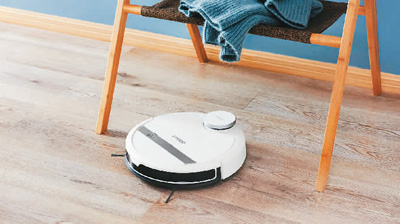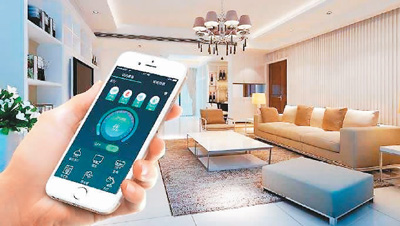"Freeing hands" has become a new trend of consumption. Have you used smart home appliances?

The sweeping robot is working. The picture comes from the Internet.

The user is controlling the smart home through the application on the mobile phone. The picture comes from the Internet.
Recently, Ms. Zhang, who works in Wangjing, Beijing, opened the mobile APP as usual, and her fingertips were a little lighter. The Xiaomi sweeping robot in Tongzhou’s home responded and began to clean house by house according to the previously scanned route. Remote control of the cleaning robot at home, which used to appear in science fiction movies, is now the daily life of many families.
Chatting, entertainment, housework and safety … … With the gradual maturity of artificial intelligence and Internet of Things technology, a variety of intelligent products emerge in an endless stream, from intelligent sweeping robots to smart speakers and intelligent companion robots to smart door locks and smart toilet seats. More and more smart home products "fly into the homes of ordinary people", which is becoming a popular product in life and a new trend in consumption. Data show that smart home products have become a hot spot in China consumer market, showing a trend of increasing year by year.
"Freeing hands" has become a new trend of consumption
How hot is smart home? In last year’s Tmall "double 11", China consumers showed the development potential of smart home industry to the society with strong purchase demand.
"Smart homes in 2019 are very popular, but we didn’t expect to sell so well on the first day of pre-sale." The relevant person in charge of the sweeping robot brand Cobos revealed to our reporter that a product with a price of 2,699 yuan was "swept" by consumers, and 10,000 units were sold within 32 minutes of the pre-sale.
"Smart home has become a new consumption trend. On the Tmall platform, not only smart pianos and AR voice globes have emerged ‘ Qiqi ’ Intelligent new species, traditional ‘ Black and white electricity ’ Also began to collectively transform smart home appliances. " Yang Guang, general manager of Tmall Consumer Electronics Division, said that last year, Tmall double 11’s smart home products covered 60 categories such as household cleaning, lighting, audio-visual entertainment, personal care, kitchen appliances, home security, etc., and the voice interactive products that can free hands became the latest consumption trend.
Voice assistant is one of the focuses of smart home development at present. Alibaba’s smart speaker "Tmall Elf" can realize many functions including smart home control, mobile phone recharge, take-out, playing music and so on. The intelligent voice assistant "Little Love Classmate" is connected with many smart home devices on the Xiaomi ecological chain. According to statistics, "Little Love Classmate" has been applied on more than 100 million devices.
The trend of intelligent home has attracted many related enterprises to enter the blue ocean of this market. Forward-looking Industry Research Institute predicts that the smart home market in China will reach 436.9 billion yuan in 2021.
"These little tricks are especially useful."
The emergence of 5G and the combination of AI (Artificial Intelligence) and IoT (Internet of Things) bring greater possibilities for the all-round development of smart homes.
At last year’s Huawei HiLink Eco-conference, Yu Chengdong, CEO of Huawei’s consumer business, released the "Full Scene Smart Life Strategy", covering four major scenes of "Smart Home, Mobile Office, Smart Travel, and Sports Health", aiming at creating a full scene smart life experience for consumers. In addition, Huawei also released a whole house intelligent solution.
"We have set a standard for consumers to simply experience." Zhi Hao, president of Huawei IoT, told this reporter, "Imagine working in an office in intelligent furniture, which is equipped with the whole house of Huawei. You can set working mode, rest mode, leaving mode, etc. I want to have a rest at noon. The voice says that as soon as the curtain is closed, it will help you close it, and the air purifier will be automatically put into sleep mode. Don’t look at these little tricks, they are especially easy to use. After sleeping for a while, the system was switched to working mode, and the curtain air conditioner was automatically turned on, and the experience was very good. "
Not only Huawei, but also Xiaomi’s pace in smart home solutions is accelerating. With artificial intelligence, Internet of Things and other technologies, Xiaomi Smart Home covers a wide range of user groups and has built a wealth of application scenarios.
Crack the "pain point" of industry development
The rise of smart home industry can not be separated from the support of various national policies such as "Guide to the Construction of Integrated Standardization System for Smart Families" and "Three-year Action Plan for Promoting the Development of a New Generation of Artificial Intelligence Industry (2018-2020)".
Although the smart home market has broad prospects, there are still some problems such as insufficient interconnection between products, many and scattered application scenarios, and too complicated operation.
Since 2014, Internet companies, mobile phone manufacturers and home appliance manufacturers have entered the smart home industry, but there are huge differences between smart home brands and products, and the inability to connect with each other is the biggest "pain point" that hinders the development of the industry. Zhang Jianfeng, deputy secretary-general of china national household electric appliances commercial association, said: "The value of the Internet of Things originally lies in the synergy between devices, but in the smart home market, it is difficult to forge a linked industrial collaboration platform in a short time, which will directly affect consumers’ purchase choices."
However, the situation is changing, and "interconnection" has been regarded as the key word of the next entrance battle for smart homes. Alibaba, Baidu, Huawei and Xiaomi all set up their own smart home platforms, and smart home devices began to "test the water" to support multiple smart home platform systems.
"Because on the same track, we need to help each other more." Zhi Hao told this reporter, "Everyone is running on the runway, but the mode is different. Our mode is openness. I hope that our partners will give full play to their advantages and focus on their smart home appliances, and we will do our best to open the connection service."